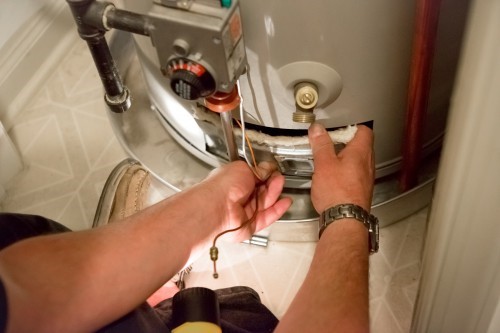Utility Room Safety Tips

Whenever you put fuel and electricity together, you have a potent combination that could become hazardous to your health. You should maintain your utility room with a view to improving your indoor air quality and decreasing the risk of fire. This guide identifies ways that you can minimize hazards in proximity to your electrical and HVAC equipment.
Ventilate the Space
Each of your heat-generating appliances needs adequate ventilation, particularly if you run your furnace or dryer on natural gas. Ventilation calls for available air to be drawn into the appliance, and a viable means to expel the exhaust out of the home. Avoid blocking your furnace or other appliances with storage boxes, bins and clutter. If you have appliances that use atmospheric combustion, verify that the space surrounding them is big enough to provide the necessary air for combustion. Seal air leaks in the room, so that incoming drafts do not compromise your indoor air quality.
Maintain Water Heater
Hot water does not necessarily present the same kinds of dangers as noxious gases or a fire, but they still affect your safety. If your water heater is housed in the same room or space as your laundry equipment and your furnace, damage to one could hurt the entire system. Confirm that the water heater pressure relief valve is in good working order, and request regular service from Sacramento plumbers to keep all components in check.
Avoid Flammable or Noxious Substances
Even if the room is nicely ventilated with sealed combustion appliances and a built-in fan, you still need to take care to avoid combining flammable materials and burning fuel, as well as other noxious substances. Never store flammable solutions like paint or lighter fluid near any appliance relying on combustion. Clean dryer vents and lint traps, to reduce the availability of materials that could turn ignition into fire. Keep cleaning products tightly closed and out of the reach of children. Avoid mixing solutions (e.g. ammonia and bleach) if you do not understand the potential hazards related to them.
Clean the Room
Sometimes, the biggest risks in the rooms of your home come from materials that are relatively harmless on their own. For example, clutter is a major fire risk. Clutter restricts ventilation and makes it harder for you to get around the room. Stacked clutter is likely to topple onto an appliance, and many types of clutter do not contain flame retardants. Keep the floor clean and clear, to discourage disease-ridden rodents and insects from infesting the area and decrease your need to use pesticides. Seal gaps in the flooring and around doors and windows. Use and maintain your ventilation equipment appropriately, instead of relying on an open door or window to clear the air in the utility room.
The safety of your entire home relies on the way you keep the appliances in your utility room. Use these tips to put your utility room in order and ensure that your appliances cause you no harm. For more information about safe use of your appliances, contact Ace Plumbing.



